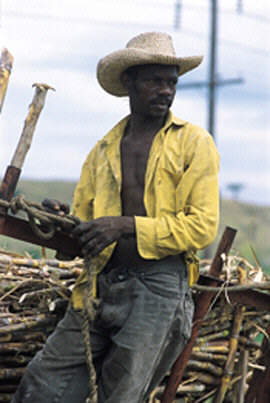 FEEDING THE COUNTRY AND COMPETING ABROAD FEEDING THE COUNTRY AND COMPETING ABROAD |
One of the sectors with more growth potential is Agribusiness, which currently accounts for 9.5% of the country's GDP. The Dominican Republic is a grand importer of food, but that is not going to be the case for much longer. As said before, one of the top priorities of the new government is to achieve self-sufficiency in whatever is possible. By 2002, the government expects that the Dominican Republic will no longer have to import rice, the nation's staple food. "Given the nature of the island, Dominicans will always need to import corn, grapes, apples, olive oil, nuts, etc. But we have an enormous potential to be self sufficient in other products, which we can export at very competitive prices to our neighboring markets. That's the idea," asserts Mr. Eligio Jáquez, Minister of Agriculture.

And what exactly can the Dominican Republic produce cheaply? Tropical fruits and organic vegetables for one - just what the ever more health-oriented society is demanding. In the first six months of 2001 the Dominican Republic was already ranked as the first largest exporter to the United States of sweet potatoes and coconuts (canned and frozen).
It ranked second in papaya pulp, canned guayaba and dasheens; third in avocados, fourth in eggplants, fifth in cantaloupes and papayas, sixth in peppers and cucumbers, seventh in plantains and ninth in bananas. The new agribusiness is young and booming. Everything indicates it's in for a golden harvest.
| And they are working to improve it. The government has just created a biotech lab and Spanish loans are financing 295 greenhouses -4,800 meters each- dedicated solely to producing peppers, tomatoes, cucumbers and other vegetables for the US market. The Dominican Republic exports over 40 million dollars of these annually. "We had never prepared before to become a main source of agricultural goods for other countries. But we are located in a very favorable geographic location that makes us very attractive to big markets, like the U.S., Canada, Puerto Rico and other Caribbean islands. Now is the time to take advantage of what we have," says Mr. Jáquez.
The Dominican Republic could export more but the European Union slaps on quotas and other difficulties for Dominican produce to enter its markets while the U.S. protects its farmers by alleging health regulations, Dominican agriculture officials complain. Yet the Dominican farmers, although exasperated by discriminatory practices against their products, are optimistic that soon enough those health excuses will be washed away since, after all, an island is one of the easiest places to control sanitarily.
Coffee is another daring enterprise in which the Mejia government has put in a strong bid. This business was on the decline and merely held on to by aristocratic families until the Dominican Coffee Council was created in September 2000. The Dominican Republic has taken note that their neighbors, like Jamaica, Guatemala or Costa Rica, are selling coffee at prime rates in the international markets. Having the highest mountains and lush and fertile soil, there should be no reason why the Dominican Republic is not in this plush market. "We have not promoted our product enough for it to be known in Europe and the rest of the world," admits Mr. Leonidas Batista Diaz, director of Codocafe. "But, a new opportunity is opening before us with sustainable agriculture, with organic and gourmet coffee," he adds. Mr. Batista has an ecologically correct vision of what coffee drinkers in the developed world will like: "Coffee grown with no pesticides that is nature friendly, aids farmers and provides shelter for birds (the Dominican Republic actually holds 137,500 hectares of coffee forests, mostly in mountains) has its market niche. You see, conventional coffee sells for 60 dollars, but we are selling organic coffee for 139 dollars a quintal. This is why the Dominican coffee council has directed its policies towards producing special coffees." |

